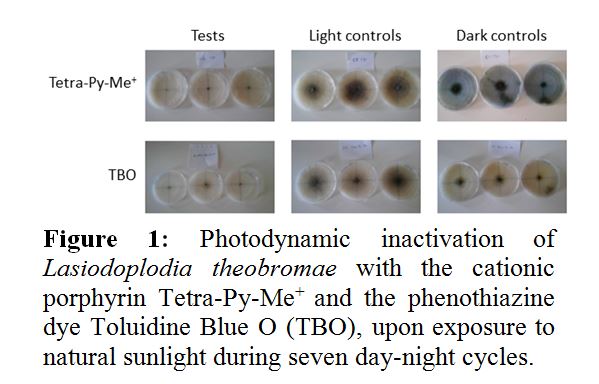
Maria Angela Cunha
University of Aveiro, Portugal
Title: Photodynamic inactivation of phytopathogenic fungi with natural and synthetic photosensitizers
Biography
Biography: Maria Angela Cunha
Abstract
Diseases caused by phytopathogenic fungi on vine and fruit trees are associated with important economic losses. With the aim of reducing the environmental impacts of traditional fungicides used in agriculture, innovative approaches to inactivate fungi in environmental matrices are being investigated. In this context, the photodynamic effect, in which the combination of a photosensitizer, visible light and molecular oxygen leads to the formation of cytotoxic species of oxygen, represents a promising perspective. The objective of this work was to evaluate the efficiency of photodynamic inactivation (PDI) of model phytopathogenic fungi (Lasiodoplodia theobromae and Botrytis cinerea) with natural (curcumin and riboflavin) and synthetic (cationic porphyrin Tetra-Py-Me+ and toluidine blue O) photosensitizers. Exposure to natural sunlight during 7 day-night cycles, in presence of 500 µM of Tetra-Py-Me+ or 500 µM toluidine blue O, attenuated the growth of L. theobromae by 35% and 26%, respectively (Figure 1). Curcumin and riboflavin failed to cause significant inactivation. Light alone (light control) and exposure to the photosensitizer in the absence of light (dark control) did not affect the growth of L. theobromae. On the contrary, the growth of B. cinerea was significantly inhibited by light alone. Tetra-Py-Me+ and toluidine blue O caused 90% and 93% attenuation of growth, respectively, in relation to the dark control. PDI with the natural photosensitizers was also not significant. The results confirm that PDI with porphyrins or phenothiazines may be further explored as a viable alternative to chemical fungicides in the control of phytopathogenic fungi. However, repeated treatments may be required considering that in field conditions, fungi may recover from sub-lethal damage, during the night period.
Recent Publications
- Fernández L, Esteves VI, Cunha A, Schneider RJ, Tomé JPC (2016) Photodegradation of organic pollutants in water by immobilized porphyrins and phthalocyanines. Journal of Porphyrins and Phthalocyanines 20:150–166.
- Rocha DM, Venkatramaiah N, Gomes MC, Almeida A, Faustino, MA, Paz FA, Cunha Â, Tomé JP (2015) Photodynamic inactivation of Escherichia coli with cationic ammonium Zn (ii) phthalocyanines. Photochemical & Photobiological Sciences 14(10):1872-1879.
- Beirão S, Fernandes S, Coelho J, Faustino MAF, Tomé JPC, Neves MGPMS, Tomé A, Almeida A, Cunha A (2014) Photodynamic inactivation of bacterial and yeast biofilms with a cationic porphyrin. Photochemistry & Photobiology 90(6):1387–1396.
- Gomes MC, Silva S, Faustino MAF, Neves MGPMS, Almeida A, Cavaleiro, JAS, Tomé JPC, Cunha A (2013) Cationic galactoporphyrin photosensitisers against UV-B resistant bacteria: oxidation of lipids and proteins by 1O2. Photochemical & Photobiological Sciences 12:262–271.
- Gomes MC, Woranovicz-Barreira SM, Faustino MAF, Fernandes R, Neves MGPMS, Tomé AC, Gomes NCM, Almeida A, Cavaleiro, JAS, Cunha A, Tomé JPC (2011) Photodynamic inactivation of Penicillium chrysogenum conidia by cationic porphyrins. Photochemical & Photobiological Sciences 10:1735-1743.


